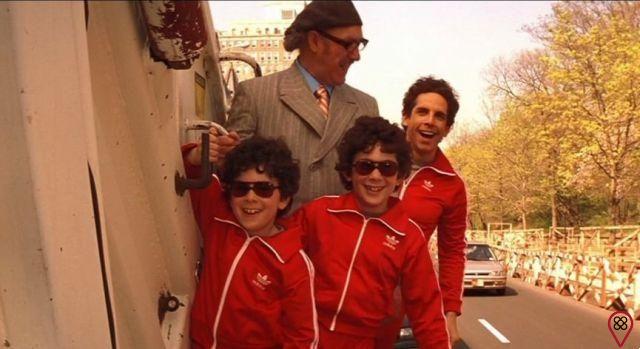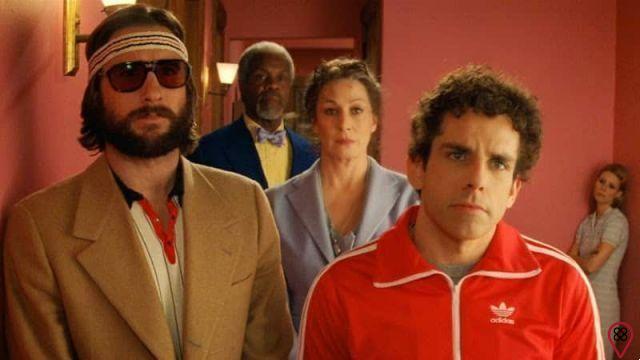The third film in the fast-paced filmography of Texan filmmaker Wes Anderson stands out for being the palpable consolidation of his textual, aesthetic and conceptual style displayed throughout his series of films. “Os Eccentrics Tenenbaums” directly demonstrates the concept of eccentricity, delicacy, subjectivity and experimentation common in most films produced by the American. Wes exceptionally applied this whole theoretical set in an unusual family, he managed to convert an entire simple context into something relatively emblematic, beautiful and sensitive to the eyes. Yes, there is magic between the lines of the text composition argument, the characters are poetically versed (they are unique and original), the setting and ambiance carry the charm of being eccentric.
Written by Wes Anderson himself in partnership with actor Owen Wilson, who is also part of the main cast of the film (nominated for an Oscar, in the category of Best Original Screenplay, in 2002). "Os Eccentrics Tenenbaums" has as its central plot the story of a complex and strange family, this family has in its family nucleus three totally different children, complex, intelligent, prodigies and singular, who sadly are fragile, unstable, egocentric, sullen, antisocial and lonely. In addition, they failed to meet the expectations speculated by parents Royal and Etheline. The parents, respectively, are in the middle of a maddening divorce process, and in the midst of it all, Etheline is starting a new relationship. Royal, totally clueless, decides to return to his old home with the ''mission'' of trying to reunite his prodigy children.
Wes and Owen took care in developing the characters, the script was built impeccably. Here, however, the unity of the whole is very suggestively and interestingly maintained by the idea that the eccentricity of personas is viscerally applied to an unusual American family. The characters express Wes's intentionality. Something regular in their unique style of composition, in general trends, the characters exert a psychological effect when we look at the family environment in which they are inserted. They are transparent from the first chapter of the film, but never completely, which intensifies the peculiar charm of the elaboration. However, it is clear to the viewer who they are and what motivates each character, during the film we can visualize and understand how significant and meaningful the abandonment of a father can be, and how this directly affects the way the family relates, especially the trio of children. Since the feature, thus, inserts depressed, insecure and gloomy characters who actively resort to the deprivation of their feelings and their own everyday reality.
Let's go to the kids, Chas (Ben Stiller) is the type of person who can't handle losses, Margot (Gwyneth Paltrow) is mysterious and always chooses to hide her secrets from the whole family, can't be honest and direct with anyone, and Richie (Luke Wilson), who gave up a rising career and socializing for not knowing how to deal with the feelings he silently harbors for his step-sister Margot. In short, they are subjective, dull, unhappy, depressive, sensitive people who are not satisfied with the meaning of their lives.

In a more exact sense, the characters in Wes Anderson's gallery are maladjusted with regard to the standards of life of normative society, they go beyond their self-transformation and differentiation, which provides dynamism to every movement of general and singular composition of each one, they experience a constant struggle, the struggle against form itself, against the principle of form. In order to understand them, it is necessary to codify the paradoxical situations of everyday life and interpret the inconstant, demanding, insistent and abnormal relationships that the plot deepens. Royal's children grew up as prodigies, idolized and overrated by him and his ex-wife. However, the trauma of abandonment has created adults who are narcissistic, dissatisfied and self-centered in terms of the weight that genius has imposed on them. This characteristic echoes substantially in all the other supporting characters in the work. Finally, we come across these considerations, with a foundation that can be proven inside and, to a greater extent, outside each child of the couple. This is perhaps, in general, what I can indicate here as an intentional critique of modern individualism, a concept heavily criticized by Wes in the film. The fact is that the trio of protagonists carry the weight of a remarkable past and an irresolute future, they are pragmatic and composed of intangible feelings and inert flows, they are beings made up of particles that fill them and leave them empty at the same time. In this way, life and everything that surrounds them is immediately expressed in each one, this factor determines the conduct of their common and independent destiny.
All this dense contextualization only confirms how unusual the parallel reality in which the plot of ''The Eccentric Tenenbaums'' takes place can be. Even when the narrator states that the narrative space is the American city of New York, at no time is this punctuated as a place of action in the film. In theory, in the process of artistic construction, the scenography of the film can even lead us to think that the film is set in New York City, but if we realize at the same time this setting can be projected in any city in the world. The house and costumes of the characters are organized so that they do not have a specific decade, Wes wanted to organize them in multiple periods of the recent century and the previous century and thus develop in the plot the conduction of lost characters in non-places.
The photography by Robert Yeoman (Nominated for the Oscar for Best Cinematography, in 2015, for his work on “The Grand Budapest Hotel”, another film by Wes) instigates the core of the characters. Wes Anderson is obsessed with symmetry and with the support of Yeoman, who developed the scenography for his other projects, he seeks to dialogue with the public, always making it clear, through centralization, who is the most important on the scene. All characters and scenarios are always visually organized in this way, with the exception of Margot, who, as her father remembers, is not a biological daughter, so she is purposely placed in the corner of the screen, outside the visual dimension projected by the duo. This visual construction expands the narrative effect of the feature, not to mention that it continues the effect proposed in all of Anderson's films.
When we talk about a feature produced by Wes Anderson, photography, production design and art direction are strengths that drive the plot as much as the script itself. The color palette selected by Carl Sprague for each character also describes a bit of each character's individual personality. In addition to a very intriguing story, the film has an impeccable soundtrack, with artists such as: Bob Dylan, The Velvet Underground, The Clash, Elliott Smith, John Lennon, Ramones, among others.

Structurally speaking, the feature is built like a family chronicle book, where each chapter illustrates a character while the subplot takes place throughout this period. However, it is important to remember that it is impossible to separate any theme that does not focus on Royal Tenenbaum, the pompous and good-natured father of the family. It should be noted that all the situations constructed in the film's scenes are due to the abandonment of this father. The role won Gene Hackman the National Society of Film Critics Award for Best Actor, the Golden Globe Award for Best Actor in a Comedy or Musical, the Chicago Film Critics Association for Best Actor, the Boston Society of Film Critics for Best Actor, and was nominated for a Satellite Award for Best Actor in a Motion Picture Musical or Comedy. Unfortunately, however, he failed to be nominated for an Oscar for Best Actor. Bringing it to 2020, how did this family react to the COVID-19 pandemic? (laughs).
Royal is a dubious, egocentric and selfish character and the script tried to create this doubt about the real reason for his return home. Was it really the expulsion from the hotel where he lived or was it the announcement of his ex-wife's marriage that motivated this return? Whatever the answer, the intention of Owen Wilson and Wes Anderson would not change the blind selfishness and vile insensitivity of this complex character, who does not hesitate to play with the feelings of others. In summary, Royal Tenenbaum is not just a crook, it's a bigger brand scam, who takes pleasure when everything flows in his favor. Even if the final text of the film tries to reveal the acts committed by him, it is impossible to erase the erasures he left in the history of this different family.
You may also like
- Understand how the movie "Like Stars on Earth" addresses the theme of dyslexia
- Discover the great teaching behind “Dead Poets Society”
- Discover the meaning behind the story of “Bird Box”
In short, the feature is classified as a dramatic comedy, as the text manages to get some laughs, while presenting a dramatic nature in several scenes. Owen and Wes were insightful in writing a text where several controversial themes are clear, and it's masterful how they managed to present all this in such a natural way. Wes and Owen sublimely addressed topics such as: death, incest, depression, suicide, betrayal, abandonment, toxic parents, divorce, career, success, etc. Such care has earned the duo nominations for the Academy Award for Best Original Screenplay, the BAFTA for Cinema in the Best Original Screenplay category, the Writers Guild of America Award for Best Original Screenplay, the Phoenix Film Critics Society Award for Best Original Screenplay, the Online Film Critics Society Award for Best Original Screenplay and the Chicago Film Critics Association Award for Best Original Screenplay.
This third film in Wes' career highlights the space built by a young filmmaker by showing that he is much more than everyday stories told in an unusual way, he is able to gather a good cast and give space for everyone to have their moment of importance. without being overshadowed by anyone, but shining together. That's the power of Anderson's magic. It's his private world power.

























